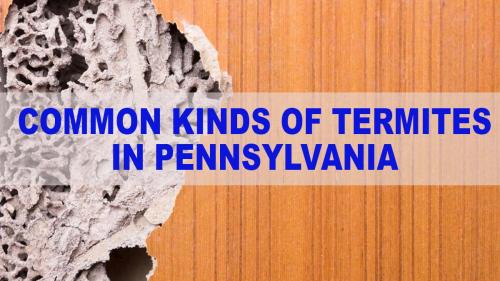Common Kinds of Termites in Pennsylvania

Welcome to the riveting world of termites - those tiny creatures that can wreak havoc on our homes! Pennsylvania has diverse termite species, each with unique habits and characteristics. From the subterranean termites that build massive underground colonies to the dry wood termites that can silently destroy your wooden furniture, there's never a dull moment when it comes to these little buggers.
So, grab your magnifying glass and look at Pennsylvania's typical termites. You may learn something new and fascinating about these tiny creatures - or at the very least. This article will help protect your home from its destructive tendencies.
The Silent Invaders
Subterranean termites are sneaky little insects that can tunnel underground and enter your home without you knowing. But these termites are actual and can cause severe damage if left unchecked. So if you want to protect your home from these subterranean scoundrels, here are some characteristics and behaviors of subterranean termites:
Lives underground: Subterranean termites build their colonies in the soil and use tunnels to travel to food sources. It includes wooden structures like your house.
Requires moisture: Subterranean termites build their nests near water sources like leaky pipes or damp basements because they need moisture to survive.
Forms large colonies: Subterranean termite colonies can contain hundreds of thousands of individual termites. They work together to gather food and expand their nest.
Causes extensive damage: Subterranean termites can cause significant damage to wooden structures over time. It includes floors, walls, and even the foundation of your home.
Builds mud tubes: To avoid predators and moisten their environment, subterranean termites build mud tubes from the soil to the wooden structures they infest.
Can be hard to find: Subterranean termites hide in wood structures until they cause significant damage.
The Moisture Lovers
Dampwood termites are less common than subterranean termites but still exist in many parts of the United States, including Pennsylvania. Understanding the behavior and habits of damp wood termites is essential for preventing infestations and protecting your property. Here are some characteristics and behaviors of Dampwood termites:
Moisture-loving insects: Moist conditions are ideal for the survival of damp wood termites, which infest wet or rotting wood.
Less common than subterranean termites: There are fewer damp wood termites than those. However, they can still cause significant damage to homes and buildings.
Larger than subterranean termites: Dampwood termites are more significant than subterranean termites, with some species measuring up to an inch long.
Infest decaying wood: Dampwood termites infest decaying or water-damaged wood, such as logs, stumps, or fallen trees.
Colonies are often small: Dampwood termite colonies are usually smaller than subterranean ones and may only have a few hundred individuals.
Limited damage: While damp wood termites can cause significant damage to decaying or water-damaged wood, they are less likely to infest and damage dry, sound wood-like subterranean termites.
The Wood-Devouring Pests
Drywood termites may sound like the perfect houseguests - they don't need soil, they don't require moisture, and they won't leave muddy footprints all over your carpets. Though their routines may seem helpful initially, you shouldn't rely on them. If they get a chance, these pests seriously threaten your home's structure, flooring, and furniture. So roll up your sleeves and battle these sneaky termite intruders!
Here are some characteristics and behaviors of dry wood termites:
No need for soil or moisture: Unlike subterranean termites, dry wood termites don't need contact with dirt or water to survive.
Infest dry wood: Drywood termites prefer to infest dry wood, such as wooden furniture, floors, and walls.
Smaller colonies: Colonies of dry wood termites typically consist of fewer than tens of thousands of individuals, making them smaller than their underground counterparts.
Limited distribution: Drywood termites are most common in warmer regions, including parts of Pennsylvania.
No tunnels or mud tubes: Drywood termites don't build tunnels or mud tubes like subterranean termites, making them harder to detect.
Damage to wooden structures: Drywood termites can cause significant damage to wooden structures, including floors, furniture, and walls.
Keeping Termites at Bay
Preventing termite infestation is vital because termites can cause significant damage to our homes and buildings. Termites are tiny bugs that eat wood and other things with cellulose, like paper and cardboard. They can weaken the structure of a building by eating through wooden support beams, flooring, and walls.
If left untreated, termite infestations can lead to costly repairs and even compromise the safety of a building.
Some things you can do to prevent termite infestations include
Keep your home clean and dry. Termites like damp and dirty places, so immediately clean up any spills or leaks.
Fix any leaks in your pipes or faucets. Termites need water to survive; a leaky pipe can provide them with all the necessary water.
Cover any cracks in your home's foundation. Termites can squeeze through even the tiniest gaps, so seal them up.
Have your home inspected for termites regularly. A professional can spot signs of termite activity and help you prevent an infestation.
Remove any old or dead wood around your house, including firewood, branches, and stumps. Termites love to eat wood, so don't give them a feast!
Keep plants and mulch at least 6 inches from your home's foundation.
It Pays to be Aware
While the common termites found in Pennsylvania might not appear dangerous at first glance, they can cause significant structural damage. Don’t underestimate these little buggers, from the hungry subterranean termites to the pesky dry wood termites.
So, if you're facing a termite infestation, it's time to take action! Don't let these tiny terrors ruin your home and peace of mind. Contact a pest control service like termite removal in York, PA, and let them handle the problem professionally. It's worth knowing that no termites will nibble at your walls as you sleep.
Termites may be tiny creatures, but these homewreckers belong outside your home. So, please give them the boot and reclaim your space!
Post Your Ad Here
Comments